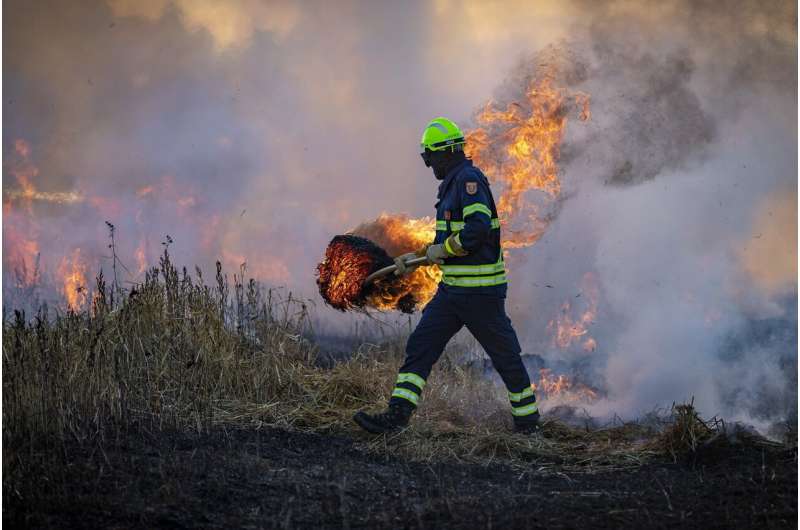This article has been reviewed according to Science X's editorial process and policies. Editors have highlighted the following attributes while ensuring the content's credibility:
fact-checked
trusted source
proofread
Expert says to brace for bushfire season ahead, but expect worse to come

The upcoming bushfire season in Australia may be bad, but future years pose a more significant threat, says a University of New South Wales bushfire expert.
The recent devastation caused by wildfires across Europe and Hawaii has sparked concerns about the return of catastrophic bushfires in Australia. Coupled with the forecast that the southern hemisphere is likely entering a hot and dry El Niño event, conditions could be favorable for major fires after a few years of subdued activity.
But Professor Jason Sharples, an expert in bushfires dynamics from UNSW Canberra, says while it's always hard to predict exactly what will unfold in Australia, it's unlikely to be a repeat of the 2019–2020 Black Summer bushfires.
"El Niño conditions don't necessarily mean we will have a worse bushfire season, though it does mean we're more likely to have hotter temperatures, less rainfall, and dry conditions that can lead to destructive fires," Prof. Sharples says. "Instead of being hit hard this year, we may see the impacts of El Niño accumulate and combine with climate change in the next season and the ones following."
However, Prof. Sharples says this season may still bring a chance of significant fires developing. Three years of increased rainfall from consecutive La Niña events has seen vegetation grow, especially grasses, and a relatively dry year so far may have begun to dry it out.
"In many areas, there is still some moisture content in forest fuels like trees, leaves and branches, as well the litter on the ground, but it takes a while, probably more than one season, to dry out," Prof. Sharples says. "So, while the vegetation has grown a lot, and there may be a lot of fuel lying around, it's probably not ready to burn with that intensity this year.
"However, there are still some forested areas that have already seen significant drying, and these areas could see intense bushfires."
The Black Summer bushfires also burned a lot of forest areas along south-east Australia already. While reburn fires could occur this year, Prof. Sharples says they're unlikely to be as severe, though other untouched forest areas along the coast could still burn.
Instead, grassland areas, which have also grown over the last few years of rainfall, may be more at risk this season.
"There is a higher possibility of grass fires this year, in areas like western New South Wales, though they're not typically as damaging as large forest fires," Prof. Sharples says.
"The biggest area burnt in Australia was due to a series of grassland fires that burnt 100 million hectares following a strong La Niña, so they can still be a significant hazard, particularly in rural areas."
Future bushfire season threats
While this upcoming season might not hit as hard as others in recent memory, Prof. Sharples says the risk of more severe and frequent bushfires continues to grow from human-driven climate change.
"The fact that our worst bushfire season on record didn't coincide with an El Niño suggests climate change is acting, and we should prepare for worsening bushfire conditions in the years ahead," Prof. Sharples says.
Overall, bushfire seasons are getting longer and starting earlier. Heat waves, in particular, are becoming hotter, longer, and more frequent, drying out fuels and intensifying bushfires.
"The risk of extreme bushfires is rising because of climate change, and there is a clear link between hotter temperatures and worsening bushfires," Prof. Sharples says. "They're becoming more destructive and regular, and present a unique set of hazards as they interact with the atmosphere to create violent firestorms."
Prof. Sharples says we must act now to improve fire preparedness and management strategies to mitigate the increasing threat of bushfires.
"We're not going to be able to prevent bad seasons from occurring, but we can take steps to improve fire management techniques to prevent extreme fires as much as possible," Prof. Sharples says.
"If not, we will be locked in a vicious cycle of climate change leading to larger fires and then those larger fires amplifying the effects of climate change."
Prof. Sharples also says we need more research to understand the dynamics of fires and a lot of investment and interest in different technologies to help mitigate the risk of bushfires.
"It's not the sort of problem that gets solved in a single season," Prof. Sharples says. "It will take years, possibly even decades, of research and planning to better prepare ourselves for the kinds of bushfires we had in the Black Summer season."
Provided by University of New South Wales




















